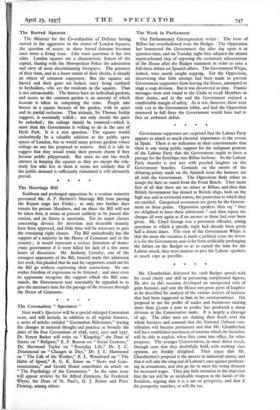Mr. Chamberlain delivered his sixth Budget speech with his usual
clarity and skill in presenting complicated figures. He also on this occasion developed an unexpected vein of grim humour, and sent the House into great gusts of laughter as he described his analysis of the various sources of taxation that had been suggested to him in his correspondence. His proposal to tax the profits of trades and businesses making more than £2,000 a year in profits has produced a sharp division in the Conservative ranks. It is largely a cleavage of age. The older men are shaking their heads over the whole business and contend that the National Defence con- tribution will become permanent and that Mr. Chamberlain will have established machinery of taxation which the Socialists will be able to exploit, when they come into office, for other purposes. The younger Conservatives, in more direct touch, through seats that they doubtfully hold, with working class opinion, are frankly delighted. They argue that Mr. Chamberlain's proposal is the answer to industrial unrest, and that it will take the sting out of Labour's case against profiteer- ing in armaments, and also go far to meet the rising demand for increased wages. They pay little attention to the objection that the tax will be an invaluable weapon in the hands of the Socialists, arguing that it is a tax on prosperity, and that if the prosperity vanishes, so will the tax.










































 Previous page
Previous page